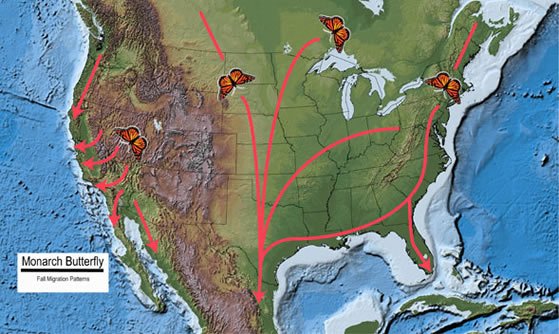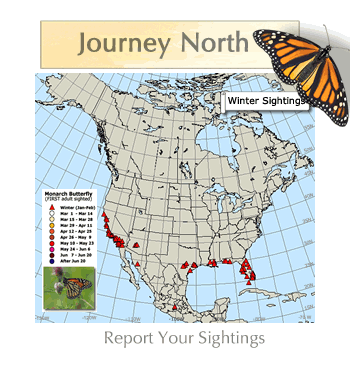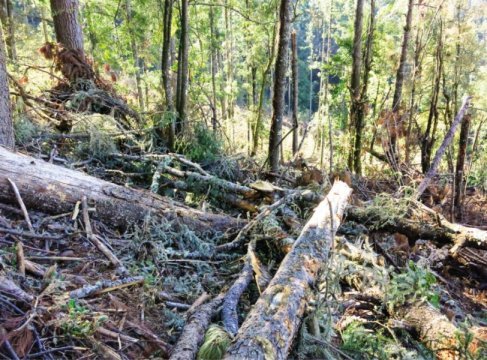Decline in Monarch Butterfly Populations Linked to March 2016 Storm in Mexico
Over the years here in eastern Nebraska I have observed less and less Monarch Butterflies toward the end of summer. A new article in Science News sheds some light on why I am observing fewer Monarch Butterflies.
Migration Routes
Monarch Butterflies east of the Rocky Mountain winter in Mexico in the Sierra Madre Mountains. One of their migrations routes brings them into eastern Nebraska.

Image Source
Monarch butterflies typically travel between 50 to 100 miles a day. Their migration can take up to 2 months to complete.

Image Source
March 2016 Storm in Mexico
A severe winter storm struck between 7-11 March 2016 bringing severe cold, snow, sleet, hail, and high winds to the monarch butterflies' wintering area in Sierra Chincua and Cerro Pelon. The area was designated a World Heritage Site, the "Monarch Butterfly Biosphere Reserve", by the United Nations in 2008.

Image Source
The storm downed several thousand Oyamel firs in the forests. To remove the downed tree because of concerns about fire and insect damage, the Mexican government permitted salvage logging of 60 thousand cubic meters of timber. This salvage logging had a further impact on the Monarch Butterflies habitat.
Estimates of Monarch Butterfly Mortality
The dense forests in the area provide a microclimate suitable for the overwintering Monarch Butterflies. However, the March 2016 storm invading this microclimate and brought severe cold into this habital zone.
Originally the mortality rate was estimated to be 7 percent. Lincoln Brower, a researcher from Sweet Briar College, studied the Sierra Chincua and Cerro Pelon Monarch Butterfly colonies and estimated the mortality rates to be 31% and 38%, respectively. It is futher estimated that the overall mortality rate was greater than 40% from just this one storm and its after effects.
Since the 1998-1997 overwintering season in Mexico researchers estimate the Monarch Butterfly population has declined by 90%.
Sources and Full Articles
Migration and Overwintering, U.S. Department of Agriculture, Forest Service
Damage to monarch butterfly colonies in 2016 storm worse than thought, Science News, 17 September 2017
Thank You!
Thank you!
Lots of these little buggers in North Dakota right now.
Here in eastern Nebraska I do not see as many as I used too. Good to know the Monarch Butterflies are plentiful in North Dakota.
Have a great week!
Steem on,
Mike
Very interesting post.
I did not know anything about this topic before. Thanks for sharing!
a good conversation topic ,, I think it will take a long time to restore the population of the butterfly, which is caused by land damage.
I agree, it could take a while before the population of Monarch Butterflies recovers.
Have a great week!
Steem on,
Mike
A good article, after I read it, may take a long, long process. When the butterfly migrates.
They can sense the danger quite before the time and I think so they change their route. Maybe it is just the possibility.